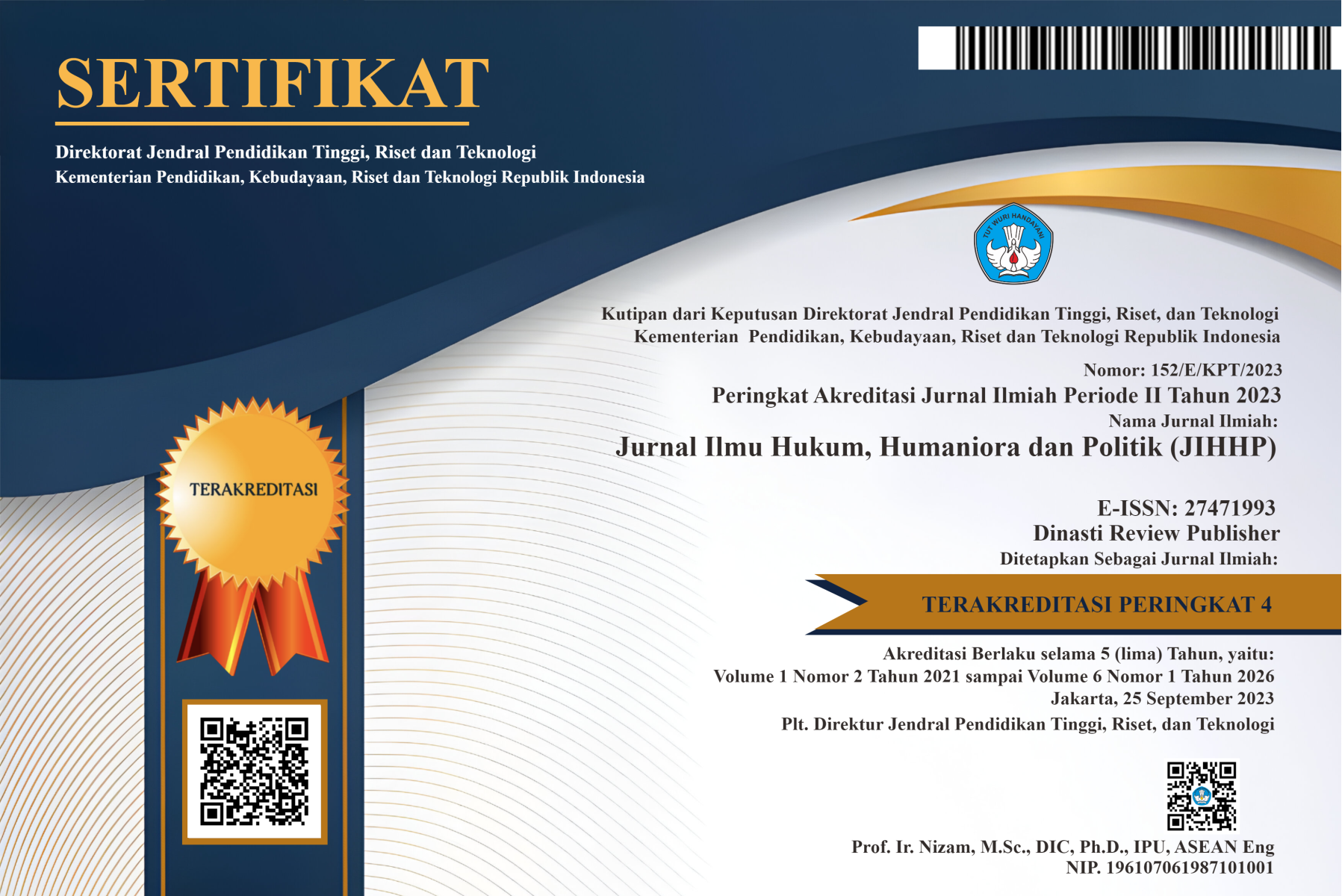Peran Fear Of Missing Out Terhadap Kecanduan Media Sosial
DOI:
https://doi.org/10.38035/jihhp.v3i3.1643Keywords:
Social Media Addiction, Fear of Missing Out, Early AdulthoodAbstract
This research aims to examine the role of fear of missing out on social media addiction in early adulthood. This research uses quantitative methods. By taking samples using a purposive sampling technique. The subjects of this research were 150 individuals in early adulthood. The data were analyzed using simple regression analysis and the results showed that there was a significant role between fear of missing out on social media addiction in early adulthood at 51.1% with a sig value of 0.00 (p<0.05).
References
Azmi, N. (2019). Hubungan antara Fear of Missing out (FoMO) dengan kecanduan media sosial pada mahasiswa. Skripsi. Fakultas Psikologi Universitas Islam Negeri Sultan Syarif Kasim Riau.
Blackwell, D., Leaman, C., Tramposch, R., Osborne, C., & Liss, M. (2017). Extraversion, neuroticism, attachment style and fear of missing out as predictors of social media use and addiction. Personality and Individual Differences, 116, 69-72.
Fathadhika, S. (2018). Social media engagement sebagai mediator antara fear of missing out dengan kecanduan media sosial pada remaja. Journal of Psychological Science and Profession, 2(3), 208-215.
Fuster, H., Chamarro, A., & Oberst, U. (2017). Fear of missing out, online social networking and mobile phone addiction: a latent profile approach. Aloma, 35(1), 23-30.
Hariadi, A. F. (2018). Hubungan antara Fear of Miss-ing Out (FOMO) dengan kecanduan media so-sial pada remaja. Skripsi. Fakultas Psikologi dan Kesehatan: Universitas Islam Negeri Sunan Am-pel.
Lewis, S., Pea, R., & Rosen, J. (2010). Beyond participation to co-creation of meaning: mobile social media in generative learning communities. Social Science Information, 49(3), 351-369.
Massie, A. (2020). Kehadiran TikTok di Masa Pandemi (The Presence of TikTok in the Pandemic).
Maulidya, F., & Adelina, M. (2018). Periodesasi perkembangan dewasa. Periodesasi Perkembangan Dewasa, 1-10.
Natari, D. A. A. (2016). Studi deskriptif mengenai body image pada wanita usia dewasa awal yang aktif menggunakan media sosial di Kota Bandung. Doctoral Dissertation. UNISBA: Fakultas Psikologi
Pratiwi, A., & Fazriani, A. (2020). Hubungan antara fear of missing out (FoMO) dengan kecanduan media sosial pada remaja pengguna media sosial. Jurnal Kesehatan, 9(1), 97-108.
Przybylski, A. K., Murayama, K., DeHaan, C. R., & Gladwell, V. (2013). Motivational, emotional, and behavioral correlates of fear of missing out. Computers In Human Behavior, 29(4), 1841-1848.
Santrock, J. W. (2007). Remaja Jilid 2. Jakarta: Erlangga.
Schou, A, C., & Pallesen, S. (2014). Social network site addiction-an overview. Current Pharmaceutical Design, 20(25), 4053-4061.
Shapiro, L. A. S., & Margolin, G. (2014). Growing up wired: Social networking sites and adolescent psychosocial development. Clinical Child And Family Psychology Review, 17(1), 1-18.
Wahyunindya, B. P., & Silaen, S. M. J. (2021). Kontrol diri dengan fear of missing out terhadap kecanduan media sosial pada remaja karang taruna bekasi utara. Ikra-ith humaniora. Jurnal Sosial dan Humaniora, 5(1), 1-8.
Downloads
Published
How to Cite
Issue
Section
License
Hak cipta :
Penulis yang mempublikasikan manuskripnya di jurnal ini menyetujui ketentuan berikut:
- Hak cipta pada setiap artikel adalah milik penulis.
- Penulis mengakui bahwa Jurnal Ilmu Hukum, Humaniora dan Politik (JIHHP) berhak menjadi yang pertama menerbitkan dengan lisensi Creative Commons Attribution 4.0 International (Attribution 4.0 International CC BY 4.0) .
- Penulis dapat mengirimkan artikel secara terpisah, mengatur distribusi non-eksklusif manuskrip yang telah diterbitkan dalam jurnal ini ke versi lain (misalnya, dikirim ke repositori institusi penulis, publikasi ke dalam buku, dll.), dengan mengakui bahwa manuskrip telah diterbitkan pertama kali di JIHHP.
















































